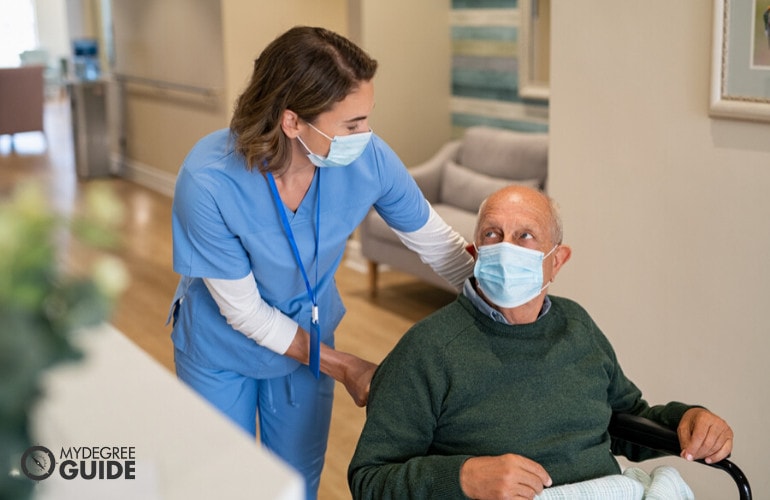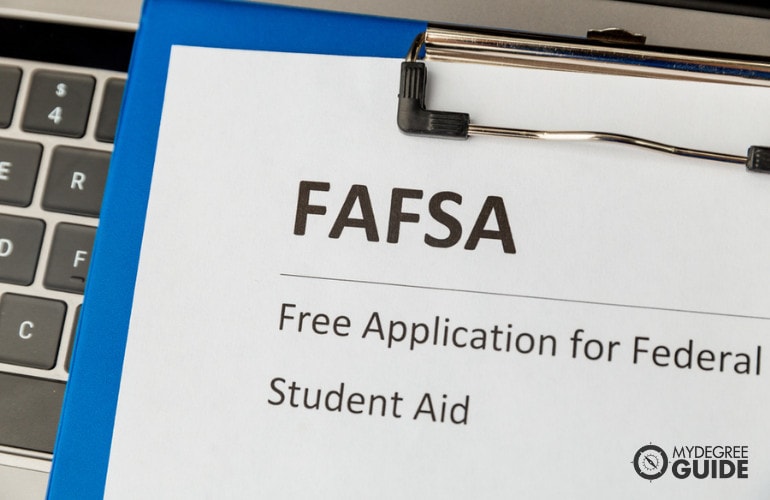What are the easiest nursing programs to get into? Nursing programs are notoriously hard to get into.

Difficult admission requirements—such as high GPA requirements, entrance exams, and strict prerequisites—turn many prospective students away from nursing. There are ways to make it easier, though. If you want to be a nurse, you don’t need to let admission requirements stand in your way.
Editorial Listing ShortCode:
Some nursing schools are easier to get into than others. They may just require a little homework to find.
Universities Offering Nursing Degree Programs With High Acceptance Rate
Methodology: The following school list is in alphabetical order. To be included, a college or university must be regionally accredited and offer degree programs online or in a hybrid format with high acceptance rate.
Metropolitan State University
Metropolitan State University offers a Registered Nurse to Bachelor of Science in Nursing program. Classes can be taken online or through a hybrid format. To graduate, students must complete 56 credits. To be eligible for the program, applicants must have a cumulative GPA of 2.5 from any previous nursing courses and be registered nurses.
Acceptance Rate: 96.7%
Metropolitan State University is accredited by the Higher Learning Commission.
Missouri Southern State University
Missouri Southern State University offers a Bachelor of Science in Nursing. Students must complete 120 credits to graduate. If an interested applicant is a registered nurse, they may enter the program as a transfer student and take exams to receive certain credits. RN to BSN applicants must have a GPA of 2.0 from a previous institution.
Acceptance Rate: 96.2%
MSSU is accredited by the Higher Learning Commission.
New Mexico State University
New Mexico State University offers a Bachelor of Science in Nursing degree with 3 entry plans, including one for registered nurses. RNs can potentially complete the program in 4 semesters when studying part-time. To be eligible for this track, applicants must be registered nurses, have a GPA of 2.75 or higher, and have an associate degree in nursing.
Acceptance Rate: 80%
NMSU is accredited by the Higher Learning Commission of the North Central Association of Schools and Colleges.
Nicholls State University
Nicholls State University offers a Registered Nurse to Bachelor of Science in Nursing program.
Students in this program may transfer 40 qualifying credits of the required 120 credits into the program. Those interested in the program must first be admitted into the school and complete 35 required courses with a GPA of 2.75. A nursing information session must also be attended.
Acceptance Rate: 92%
Nicholls State University is accredited by the Southern Association of Colleges and Schools Commission on Colleges.
North Dakota State University
North Dakota State University offers an online Registered Nurse to Bachelor of Science in Nursing program. The degree requires 120 credits, with at least 60 credits earned from a 4 year institution, to graduate. Applicants must have an associate degree in nursing, be an RN, have a GPA of 2.75, and submit 2 professional references.
Acceptance Rate: 83.5%
NDSU is accredited by the Higher Learning Commission.
Saint Mary’s College
Saint Mary’s College offers an online Bachelor of Science in Nursing program for Registered Nurses.
The program can typically be completed in 1 year. Those interested in the program must have an associate degree in nursing, be registered nurses, and have a GPA of 2.5 or higher. A resume, a personal statement, and official transcripts must be submitted when applying.
Acceptance Rate: 84.8%
Saint Mary’s College is accredited by the Higher Learning Commission.
Sonoma State University
Sonoma State University offers a number of degrees in nursing, including a Post-Licensure Bachelor of Science in Nursing.
Students may apply for acceptance into the program in their first year of an associate in nursing program or after they have already obtained their associate degree. Applicants must have 24 academic units and a GPA of 2.7 or higher.
Acceptance Rate: 81.9%
Sonoma State University is accredited by the Western Association of Schools and Colleges.
South Dakota State University
South Dakota State University offers an online Registered Nurse to Bachelor of Science in Nursing program. To graduate, students must complete 30 credit hours. Each class is 7 weeks long. Applicants must have an Associate of Nursing degree with a GPA of 2.5 or higher and must be registered nurses.
Acceptance Rate: 92%
South Dakota State University is accredited by the Higher Learning Commission.
Southeast Missouri State University
Southeast Missouri State University offers a Registered Nurse to Bachelor of Science in Nursing program. Classes are held online. To graduate, students must complete 26 nursing credits and all additional education requirements. Applicants must have a GPA of 2.5 or higher and be registered nurses.
Acceptance Rate: 97.2%
Southeast Missouri State University is accredited by the Higher Learning Commission.
Southeastern Louisiana University
Southeastern Louisiana University offers an online Registered Nurse to Bachelor of Science in Nursing.
Students may transfer up to 45 qualifying credits from past education, which gives the potential for the program to be completed in a year. Applicants must have a nursing license, an associate degree in nursing, and a grade of C or higher in nursing courses.
Acceptance Rate: 89%
Southeastern Louisiana University is accredited by the Southern Association of Colleges and Schools Commission on Colleges.
St. Cloud State University
St. Cloud State University offers a Registered Nurse to Bachelor of Science in Nursing program.
The program requires students to complete 30 credit hours to graduate and can potentially be completed in a year. Those interested in the program must be registered nurses with a minimum grade of C in each nursing course taken for an associate’s degree.
Acceptance Rate: 89.7%
Cloud State University is accredited by the Higher Learning Commission.
University of Evansville
The University of Evansville offers an online Registered Nurse to Bachelor of Science in Nursing program.
Students must complete 120 credits to earn the bachelor’s degree but may receive credits from qualifying work experience and previous education. Applicants must be registered nurses with an associate degree in nursing with a minimum GPA of 2.5.
Acceptance Rate: 80%
The University of Evansville is accredited by the Higher Learning Commission.
University of Kansas
The University of Kansas offers an online Registered Nurse to Bachelor of Science in Nursing program. To graduate, students must complete 120 credits, with a minimum of 30 credits earned at the school. Applicants must complete 60 prerequisite courses, be registered nurses, and have a minimum GPA of 2.5.
Acceptance Rate: 92.3%
The University of Kansas is accredited by the Higher Learning Commission.
University of Louisiana – Monroe
The University of Louisiana—Monroe offers a Registered Nurse to Bachelor of Science in Nursing online program. To graduate, students must complete 30 credits. Those interested in the program must have an RN license and a GPA of 2.0 or higher from an associate’s degree in nursing.
Acceptance Rate: 91%
The University of Louisiana Monroe is accredited by the Southern Association of Colleges and Schools Commission on Colleges.
University of Missouri – Columbia
The University of Missouri—Columbia offers a Registered Nurse to Bachelor of Science in Nursing program. The program allows students to complete courses online and to transfer in up to 30 qualifying credit hours. Applicants must have a minimum GPA of 2.5 from an associate degree in nursing and must be registered nurses.
Acceptance Rate: 81.5%
Mizzou is accredited by Higher Learning Commission.
University of Nevada – Las Vegas
The University of Nevada—Las Vegas offers a Bachelor of Science degree. To graduate, students must complete 122 credits.
When entering the program, students may do so through a traditional track or a registered nurse track. Applicants must be accepted into the school and submit a portfolio with a resume, statement of intent, and a copy of their RN License.
Acceptance Rate: 88%
UNLV is accredited by the Northwest Commission on Colleges and Universities.
University of Northern Colorado
The University of Northern Colorado offers a Registered Nurse to Bachelor of Science in Nursing program. The program offers online, cohort-based classes. Students are required to complete a 100 hour practicum to graduate. Applicants must have an associate’s degree and be registered nurses to be eligible for the program.
Acceptance Rate: 89%
The University of Northern Colorado is accredited by the Higher Learning Commission.
University of South Alabama
The University of South Alabama offers a Registered Nurse to Bachelor of Science in Nursing program.
The program allows students to graduate after completing 6 courses and an online professional work component. Students must complete the program within 5 years of starting it. Applicants must complete 18 prerequisite courses with a GPA of 2.5 or higher to be eligible.
Acceptance Rate: 87.2%
The University of South Alabama is accredited by the Southern Association of Colleges and Schools Commission on Colleges.
University of Utah
The University of Utah offers an online Registered Nurse to Bachelor of Science in Nursing track. The program requires students to complete 113 clinical hours and 30 credit hours. Those interested in the program must submit official transcripts, a GPA of 3.0 or higher, and 2 professional references.
Acceptance Rate: 82.6%
The University of Utah is accredited by the Northwest Commission on Colleges and Universities.
Youngstown State University
Youngstown State University offers a Registered Nurse to Bachelor of Science in Nursing online program. Students must complete 122 credit hours to graduate. Those interested in the program must have an Associate of Nursing degree with a GPA of 2.0 and must be registered nurses.
Acceptance Rate: 86.7%
Youngstown State University is accredited by the Higher Learning Commission.
Easiest Nursing Programs to Get Into

Many prospective students equate “easy to get into” with a low-quality program. That is not the case at all. There are many factors that can affect how easy a school is to get into that have nothing to do with the quality of the program itself.
The first thing you may want to consider is the admission process. The easiest nursing schools to get into typically have the least obstacles in the admission process.
Having fewer admission requirements removes entry barriers for many students. Nursing programs with the following admissions characteristics may be easier to get into:
- No entrance exam requirements
- No waiting list
- Lower GPA requirements
- No required letters of recommendation
- Fewer prerequisites required
Every school has different requirements, and every student has different strengths. Researching admission requirements can help you find the school that may be the easiest for you personally to get into.
Nursing School Acceptance Rate

A nursing school with high acceptance rates is usually easier to get into as well. Some schools only accept around 60% of their applicants. In comparison, other schools accept around 95% of their applicants.
The acceptance rate for nursing schools varies drastically, but schools that accept more students than they reject may be easier for you to get into.
Nursing Prerequisites
Some schools have a list of prerequisite courses you need to take before being admitted. These are often science and math courses. Nursing schools without prerequisites or with fewer prerequisites are often easier to get into.
What Makes It Easier to Get Into a Nursing School Compared to Another?

Generally, the admission process affects how hard it is to get into one school as compared to another.
There are other factors that can affect enrollment, though, such as:
- Number of applicants compared to seats available. If there are 2,000 applicants but only 100 seats available, competition will likely be fierce. Nursing schools with no waiting list and fewer applicants are often easier to get into.
- Multiple entrance dates. Some schools offer program admission two or three times a year, rather than just once. This can increase your chances of acceptance.
- Admission support. Looking for schools that offer help from admissions counselors can be beneficial. They can help you through the entire admissions process and help make it easier to get accepted.
- The school location and popularity. Applying to a school that is less popular or in a location that has a high demand for nurses can give you a better chance of getting in.
Researching each school you are interested in before applying can help you prepare for the admission process and know which schools you a more likely to be accepted into.
How to Increase Your Chances of Getting Accepted

There are many things you can do to try and increase your chances of being accepted, even if your school of choice has a low acceptance rate. Having your application stand out above the rest can help improve your chances of admission when competition is fierce.
It’s helpful to know what your prospective nursing school looks for in applicants. What do they require and why? Some schools put more weight on one part of the application. Finding out what your potential program values can help you focus on the parts of the application package that will most influence the admission department’s decision.
Demonstrating excellence during the admissions process can help you show that you can handle the workload if admitted. To do this, it may be necessary to do some preparation ahead of time.
The following list may not be requirements of the school you’re applying to, but preparing yourself in the following ways can help increase your chances of acceptance:
- Complete some prerequisite classes. Anatomy, microbiology, physiology, psychology, chemistry, sociology, and algebra are all useful choices.
- Work on your GPA. The required GPA for nursing school varies. Many schools require 2.5, but the higher the GPA the better.
- Keep a clean record. Many schools perform background checks. Having felony convictions or charges can make it harder to get into a nursing program.
- Gain nursing experience. You can shadow another nurse, volunteer, or even find paid work.
- Build better communication skills. Writing, public speaking, and interpersonal communications classes can help you increase your verbal and written communication skills.
- Score well on the SAT. While there are some nursing schools without entrance exams, many schools do require the SAT. Some even focus on SAT scores over GPA.
- Participate in extracurricular activities. Activities that lean towards nursing, such as participating in blood drives or volunteering at a hospital, can help your application stand out.
- Know why you want to become a nurse. Most schools require a personal essay on why you want to become a nurse as part of the admission process. Brainstorming and practicing this essay can help you prepare for this requirement.
- Research the admissions process. Knowing what is needed of you and when it will be needed can keep you from missing crucial deadlines.
Even if you know which school you want to attend, applying to a variety of backup schools can improve your chances of admission into a program. You may want to look into public, private, online, and accelerated schools.
Widening your search and going above and beyond during the admission process can increase your chances of being accepted into a nursing program.
Tips for Passing the NCLEX

The NCLEX is the licensure examination from the National Council of State Boards of Nursing. It’s a pass or fail exam that every state uses to test your skill level before granting you a nursing license.
Testers are usually allowed 6 hours to complete the NCLEX. The test consists of anywhere from 75 to 265 questions, depending on how quickly you pass or fail. Preparing ahead of time can increase your chances of passing and can make the entire experience a more positive one.
Here are some ways to improve your chances of passing the NCLEX:
- Study for the exam. The NCLEX isn’t designed to be passed after a one-night cram session. Most nursing students spend at least 2 months studying for this exam.
- Research the topics it covers. It usually covers questions surrounding safe and effective care, psychosocial integrity, health promotion and maintenance, and physiological integrity.
- Know your learning style and use it to study. Some people are notetakers. Some people are more visual, whereas others learn best through audio cues.
- Practice taking the exam. You can practice with prep tests and practice exam books or by taking a prep class. You can even enroll in a mock exam online. Taking practice exams can give you the chance to study information for any questions you get wrong.
- Prep for the exam day. Exam day is going to be long and busy. Making sure you have everything ready to go the night before can help ease some stress. Filling your gas tank, packing some snacks, and making sure you have the appropriate identification are all helpful things to do ahead of time.
The NCLEX is designed to focus on what you were taught in school, and it is purely based on science and deductive reasoning.
Admissions Requirements

Admissions requirements are different for each college of nursing. Fewer or less strict requirements can make it easier to get into one school over another.
Many nursing schools have the following requirements:
- High school diploma or GED
- Personal essay
- Letters of recommendation
- Volunteer experience
Some undergraduate programs also request you to submit SAT or ACT scores, but many schools no longer do. A number of nursing schools, though, do require applicants to take the Test of Essential Academic Skills (TEAS) as an entrance exam.
You can check a prospective school’s admission requirements before applying so you know what to prepare.
Why Choosing an Accredited Nursing Program Matters

Regional accreditation is all about quality control. It ensures all nurses, across all states, have been taught the same level of basic skills. It sets the standard for nursing care and quality education within nursing programs.
Regional accreditation also ensures the program and teaching staff meet a certain level of education as well. Many states will not let you sit for the NCLEX unless you have attended a regionally accredited program. Many forms of financial aid also require enrollment in an accredited program.
Most employers look for candidates who have graduated from accredited universities as well. Regional accreditation can offer prospective employers the assurance that you possess the knowledge and skills your degree says you do.
To check if a school you are considering is regionally accredited, you can visit the U.S. Department of Education.
Financial Aid and Scholarships

There are many avenues nursing students can search for financial aid and scholarships. Many students get assistance to pay for college through federal or state aid. To see if you qualify for financial aid, you can fill out the Free Application for Federal Student Aid (FAFSA).
There are also a variety of organizations you can check for aid opportunities. Many colleges and universities award top students scholarships and grants. Your specific nursing program might also offer financial awards.
In addition, you can check with businesses, nonprofits, professional associations, and community foundations, especially organizations that support the medical community. Many of these organizations award scholarships to students pursuing nursing.
If you currently work or volunteer, you can check with your place of employment as well. They might offer financial assistance to employees who are furthering their education.
How Hard Is It to Get Into Nursing School?

Nursing is one of the most popular college major programs for many students. Nursing programs offer a chance to learn a highly skilled, practical, hands-on career that is in high demand in many areas. Many that that go into nursing also have a passion to serve.
Nursing can also be a lucrative career. Average salaries are often high, even at entry-level. According to the Bureau of Labor Statistics, the median yearly salary for registered nurses is $75,330.
For these reasons, many want to go into nursing, but most nursing programs only have enough qualified instructors to serve 100 students or less. This means that competition for admission into nursing programs can be fierce.
Even students with high grade point averages are sometimes turned away. Almost one-third of qualified applicants are rejected from BSN programs in the US.
What Is the Quickest Way to Become an RN?

Typically, the fastest way to become an RN is to earn an associate’s degree in nursing, which is called an ADN. While you can become an RN with a bachelor’s degree, it is not necessary. An associate’s degree usually takes just 18 months to complete, while a bachelor’s usually takes 4 years to complete.
There are accelerated bachelors in nursing programs, though, that can fast-track the process. If your GPA is not as high as you would like, you may want to know that there are accelerated BSN programs with high acceptance rates offered at a growing number of universities.
Plus, some universities offer accelerated nursing programs online in addition to their classroom-based options. If you are a licensed practical nurse (LPN), you can likely build from that to earn your ADN. LDN-ADN programs usually only require half the credits as ADN programs.
Can I Get Into a Nursing Program with a 2.5 GPA?

Yes, it is possible to get into a nursing program with a 2.5 GPA. Many programs accept students with a lower GPA. It may take some extra work from you, though, especially if you are applying to a school that typically requires a higher GPA.
Emphasizing your nursing experience or your willingness to grow and learn can help you market yourself well. It may be necessary to show them your natural capabilities for nursing and anything else that you can bring to the table. If you highlight your strengths, the nursing school may consider them in addition to your GPA.
Can I Get Into Nursing School with a 2.0 GPA?
Yes, getting into nursing school with a low GPA is possible. Many colleges put preference on the SAT or the ACT over GPAs. If you have a low GPA, you may want to focus on doing well on these exams.
Some colleges have an open admission process, meaning they take anyone with a high school diploma or GED. Many hospital nursing programs and community colleges also allow for a lower GPA.
If you have a low GPA, you can focus on the other admission requirements. If you excel in those areas, you can increase your chances of being admitted.
What Do Nursing Schools Look For in Applicants?
Most nursing schools want to know that you have the desire and ability to learn. Their admission requirements, such as your GPA, personal essay, and test scores, are designed to give them a good sense of this.
They likely want to see that you have good communication skills. Nurses are expected to be able to communicate both verbally and in written form. The medical field is continuing to go digital as well, so you may need to demonstrate that you are comfortable with technology.
Why Are Many Schools with Nursing Programs Not Easy to Get Into?

The main reason many programs are not easy to get into is because they lack the capacity to teach the number of applicants they receive.
There is a shortage of nurses with master’s degrees or doctorates that are willing to teach. There is also a shortage of clinical sites and classroom space. Constricting budgets make it hard to provide the technological facilities required to teach nurses in today’s field.
Since there is limited space, nursing programs need to be picky with who they admit. So, many of them only accept the best of the best.
Is Nursing School for Me?

Deciding whether or not nursing school is right for you is a personal decision. If you are trying to determine if nursing is right for you, considering the qualities that are common among many nurses may help you decide.
Nurses are typically:
- Compassionate
- Observant
- Passionate
- Willing to learn
- Advocates
- Compelled to serve others
Time management skills, critical thinking skills, leadership skills, and physical endurance are beneficial qualities to have as a nurse as well. If these qualities describe you, then nursing might be a good fit for you.
Getting Into Nursing School

Getting a nursing degree and being accepted into nursing school is considered difficult by many. Some nursing programs, though, are easier to get into than others, particularly those with no wait list and fewer admission requirements. Online RN to BSN programs, for example, make an attractive choice for RNs who want to broaden their skill sets without the typical barriers of on-campus programs.
Luckily, you don’t have to let the admissions process stop you from pursuing a nursing degree. Casting a wide net and applying to many programs can help you find a school that fits your needs.
You can start your nursing journey today by using the tips in this article to strengthen your application and explore regionally accredited nursing programs.
